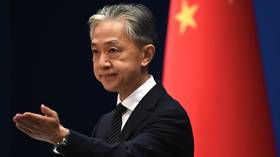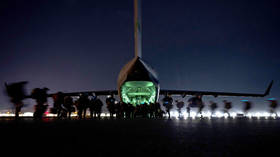China lectures US over Afghanistan withdrawal

The fall of Kabul a year ago was a failure of US hegemony and the strategy of exporting democracy globally, but Washington doesn’t appear to have learned anything from it, Chinese Foreign Ministry spokesman Wang Wenbin told reporters on Monday.
Asked about Taliban’s takeover of the Afghan capital, a year ago to date, Wang said the “Kabul moment” became a “byword for the US debacle in Afghanistan,” adding that it represented multiple American failures.
“The ‘Kabul Moment’ marks the failure of the ‘democratic transformation’ imposed by the US,” Wang said, noting that the “path to democracy varies from country to country, and will not work if it is imposed from the outside. Forcing the US-style democracy on a country has invariably led to dysfunction and failure of its implementation.”
Furthermore, Wang added, Afghanistan also represents the failure of Washington’s coalition-centric approach. The US and its allies occupied Afghanistan for 20 years, “only to flee it in a botched withdrawal. The so-called ‘leader of the West’ left its reputation in tatters when it decided to ditch its allies in the hurried retreat,” Wang said.
“More importantly, the ‘Kabul moment’ marks the failure of the US strategy of hegemony. Since the end of the Cold War, the US has been invading and interfering in countries across the world under the pretext of democracy and human rights, sowing discord and stoking confrontation for the sake of its own geopolitical objectives,” Wang said.
The Chinese Foreign Ministry spokesman pointed out that the US has seized $7 billion in Afghan assets to hinder the country’s reconstruction and development – something the Taliban government has denounced as “theft.” President Joe Biden “unfroze” about half of the funds in February 2022, only to subject them to court claims of Americans suing for damages from terrorism.
“The US has failed in Afghanistan. But it clearly has not learned the lesson,” Wang said on Monday, noting that Washington continues to “engage in political interference and manipulation worldwide in the name of democracy and human rights.” He warned that “acting against the trend of the times” will only lead to more ‘Kabul moments’ going forward.
The Taliban took Kabul on August 15, 2021 as the US-backed Afghan government collapsed. US troops and their NATO allies airlifted around 130,000 people via the Kabul airport over the following two weeks, leaving thousands of their translators and contractors behind. The last American soldier departed shortly before midnight on August 31.













